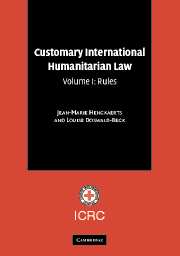Book contents
- Frontmatter
- Contents
- Foreword by ICRC President Jakob Kellenberger
- Foreword by Judge Abdul G. Koroma
- Foreword by Yves Sandoz
- Acknowledgements
- Introduction
- List of abbreviations
- Part I The Principle of Distinction
- Part II Specifically Protected Persons and Objects
- Part III Specific Methods of Warfare
- Part IV Weapons
- Part V Treatment of Civilians and Persons Hors De Combat
- Chapter 32 Fundamental Guarantees (Rules 87–105)
- Chapter 33 Combatants and Prisoner-of-War Status (Rules 106–108)
- Chapter 34 The Wounded, Sick and Shipwrecked (Rules 109–111)
- Chapter 35 The Dead (Rules 112–116)
- Chapter 36 Missing Persons (Rule 117)
- Chapter 37 Persons Deprived of Their Liberty (Rules 118–128)
- Chapter 38 Displacement and Displaced Persons (Rules 129–133)
- Chapter 39 Other Persons Afforded Specific Protection (Rules 134–138)
- Part VI Implementation
Chapter 32 - Fundamental Guarantees (Rules 87–105)
Published online by Cambridge University Press: 05 June 2012
- Frontmatter
- Contents
- Foreword by ICRC President Jakob Kellenberger
- Foreword by Judge Abdul G. Koroma
- Foreword by Yves Sandoz
- Acknowledgements
- Introduction
- List of abbreviations
- Part I The Principle of Distinction
- Part II Specifically Protected Persons and Objects
- Part III Specific Methods of Warfare
- Part IV Weapons
- Part V Treatment of Civilians and Persons Hors De Combat
- Chapter 32 Fundamental Guarantees (Rules 87–105)
- Chapter 33 Combatants and Prisoner-of-War Status (Rules 106–108)
- Chapter 34 The Wounded, Sick and Shipwrecked (Rules 109–111)
- Chapter 35 The Dead (Rules 112–116)
- Chapter 36 Missing Persons (Rule 117)
- Chapter 37 Persons Deprived of Their Liberty (Rules 118–128)
- Chapter 38 Displacement and Displaced Persons (Rules 129–133)
- Chapter 39 Other Persons Afforded Specific Protection (Rules 134–138)
- Part VI Implementation
Summary
Introduction
The fundamental guarantees identified in this chapter apply to all civilians in the power of a party to the conflict and who do not take a direct part in hostilities, as well as to all persons who are hors de combat. Because these fundamental guarantees are overarching rules that apply to all persons, they are not sub-divided into specific rules relating to different types of persons. The rules applicable to specific categories of persons are to be found in Chapters 33–39.
The fundamental guarantees listed in this chapter all have a firm basis in international humanitarian law applicable in both international and non-international armed conflicts. Most of the rules set out in this chapter are couched in traditional humanitarian law language, because this best reflects the substance of the corresponding customary rule. Some rules, however, are drafted so as to capture the essence of a range of detailed provisions relating to a specific subject, in particular the rules relating to detention (see Rule 99), forced labour (see Rule 95) and family life (see Rule 105). In addition, references to human rights law instruments, documents and case-law have been included. This was done, not for the purpose of providing an assessment of customary human rights law, but in order to support, strengthen and clarify analogous principles of humanitarian law. While it is the majority view that international human rights law only binds governments and not armed opposition groups, it is accepted that international humanitarian law binds both.
- Type
- Chapter
- Information
- Customary International Humanitarian Law , pp. 299 - 383Publisher: Cambridge University PressPrint publication year: 2005
- 4
- Cited by

